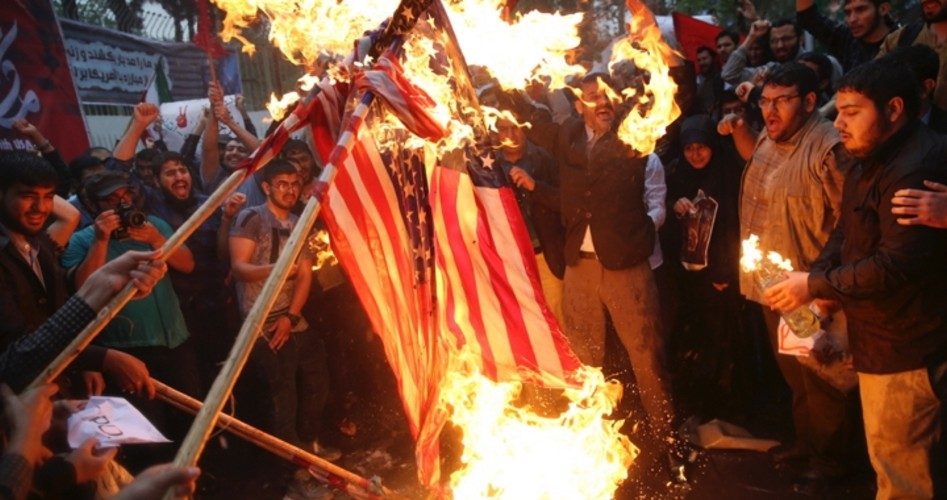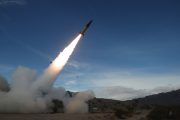
In keeping another campaign promise, President Trump pulled the United States out of the Iran nuclear agreement on Tuesday, four days ahead of the deadline. Besides ending U.S. involvement in the deal, Trump signed off on reimposing previous sanctions on Iran and said the U.S. will impose new sanctions on any country that helps Iran develop a nuclear program.
The nuclear agreement between Iran and Western nations — including the United States — was signed in 2015 and was designed to keep Iran in check by requiring regular inspections by the International Atomic Energy Agency (IAEA) in exchange for lifting sanctions against the Islamic theocracy. The agreement is known as the Joint Comprehensive Plan of Action (JCPOA)
There is no question that Iran has been enriching uranium as part of developing a nuclear program; the only question is whether that program is geared toward building nuclear weapons or is merely for the peaceful use of nuclear power. However, the uranium that is used for these different purposes is not the same: Weapons-grade uranium has a much higher concentration of fissile uranium than the uranium used in nuclear power plants. Tehran claims its nuclear program is not a weapons program and that it is not secretly trying to enrich uranium to the point where it could be used for weapons. The IAEA has issued 10 separate reports saying that Iran is in compliance with the requirements of JCPOA and is not developing nuclear bombs.
Trump’s announcement of withdrawal from the JCPOA and renewal of sanctions against Iran follows just days behind claims from Israeli Prime Minister Benjamin Netanyahu that “Iran lied” about not having a program to develop nuclear weapons. But as this writer reported in previous article, Netanyahu’s claims appear to be based on information that predates both the 2015 agreement and the 10 reports from the IAEA. Netanyahu appears to ignore the timeline and Trump appears willing to accept Netanyahu’s claims as “new and conclusive proof” that Iran is in violation of JCPOA.
Both in his presentation Monday and in statements and interviews afterward, Netanyahu called on Trump to end U.S. participation in JCPOA, saying he hoped and believed Trump would “do the right thing.”
That war appears to be brewing between Israel and Iran is a foregone conclusion. Less than an hour after Trump’s announcement to withdraw from JCPOA, “missiles fired from Israel ‘targeted weapons stores belonging to the [Iranian] Revolutionary Guard’ at a base south of the Syrian capital Damascus, according to a report by the Daily Mail.
And as paleoconservative commentator, author, broadcaster, and politician Pat Buchanan wrote in an opinion piece published by The New American and others the day of Trump’s announcement but written earlier:
This next week may determine whether President Trump extricates us from that cauldron of conflict that is the Middle East, as he promised, or plunges us even deeper into these forever wars.
Friday will see the sixth in a row of weekly protests at the Gaza border fence in clashes that have left 40 Palestinians dead and 1,500 wounded by live fire from Israeli troops.
Monday, the U.S. moves its embassy to Jerusalem. Tuesday will see the triumphal celebration of the 70th birthday of the state of Israel.
Palestinians will commemorate May 15 as Nakba, “The catastrophe,” where hundred of thousands of their people fled their homes in terror to live in stateless exile for seven decades.
Violence could begin Friday and stretch into next week.
Yet more fateful for our future is the decision Trump will make by Saturday. May 12 is his deadline to decide whether America trashes the Iran nuclear deal and reimposes sanctions.
While some may have considered Buchanan’s predictions to be both melodramatic and overly pessimistic when they were first published, it now appears that he was perhaps too optimistic; It took less than an hour for the violence to escalate and bring the United States within the range of war with Iran.
In fact, Trump hinted at as much in his remarks announcing U.S. withdrawal from JCPOA, saying, “If the regime continues its nuclear aspirations, it will have bigger problems than it has ever had before.” At a joint press conference with German Chancellor Angela Merkel last month, Trump brushed off a question of war with Iran while appearing to leave the option on the table, saying, “I don’t talk about whether or not I would use military force.” He quickly added, “But I can tell you this, they will not be doing nuclear weapons. That I can tell you. OK? They are not going to be doing nuclear weapons. You can bank on it.”
But Merkel, along with other European leaders including U.K. Prime Minister Theresa May and French President Emmanuel Macron see U.S. withdrawal from JCPOA — especially if accompanied by threats of retribution to nations committed to maintaining the deal — as almost a sure path to both a renewal of Iran’s nuclear development program and war with Iran. In a joint statement following Trump’s announcement, they wrote, “It is with regret and concern that we, the Leaders of France, Germany and the United Kingdom take note of President Trump’s decision to withdraw the United States of America from the Joint Comprehensive Plan of Action.”
That statement went on to say:
We recall that the JCPoA was unanimously endorsed by the UN Security Council in resolution 2231. This resolution remains the binding international legal framework for the resolution of the dispute about the Iranian nuclear programme.
We urge all sides to remain committed to its full implementation and to act in a spirit of responsibility.
And, recalling the 10 reports of the IAEA, the statement also said:
According to the IAEA, Iran continues to abide by the restrictions set out by the JCPoA, in line with its obligations under the Treaty on the Non-Proliferation of Nuclear Weapons. The world is a safer place as a result. Therefore we, the E3, will remain parties to the JCPoA. Our governments remain committed to ensuring the agreement is upheld, and will work with all the remaining parties to the deal to ensure this remains the case including through ensuring the continuing economic benefits to the Iranian people that are linked to the agreement.
Macron tweeted, “France, Germany, and the UK regret the U.S. decision to leave the JCPOA (Iran deal). The nuclear non-proliferation regime is at stake,” adding, “We will work collectively on a broader framework, covering nuclear activity, the post-2025 period, ballistic activity, and stability in the Middle-East, notably Syria, Yemen, and Iraq.”
Even ahead of Trump’s announcement, Macron warned that it could lead to war, telling Der Spiegel, “We would open the Pandora’s box. There could be war.”
And EU foreign policy chief Federica Mogherini was even more pointed, saying that the EU will resist U.S. interference in the success of JCPOA which “is delivering on its goal which is guaranteeing that Iran doesn’t develop nuclear weapons.” Mogherini said, “Together with the rest of the international community, we will preserve this nuclear deal.”
Iranian President Hassan Rouhani has said that Iran will continue JCPOA with the other countries that signed the agreement and have committed to keeping it. What remain uncertain is whether the Trump administration will consider those nations — by continuing to trade with Iran — to be guilty of helping the Islamic theocracy in its development of a nuclear program. If so, will he make good his threat to punish them with severe sanctions, further isolating the U.S. from her trade allies?
To that end, the joint statement by Merkel, May, and Macron said,
We urge the U.S. to ensure that the structures of the JCPoA can remain intact, and to avoid taking action which obstructs its full implementation by all other parties to the deal. After engaging with the US Administration in a thorough manner over the past months, we call on the US to do everything possible to preserve the gains for nuclear non-proliferation brought about by the JCPoA, by allowing for a continued enforcement of its main elements.
While the U.S. should — in keeping with the foreign policy advice of both George Washington and Thomas Jefferson — avoid “entangling alliances” (which may fit well with withdrawal from an agreement that should rightly have only been entered into by a treaty requiring ratification by the Senate), threatening other sovereign nations in an attempt to force their withdrawal is the very antithesis of minding one’s own national business.
What cannot be ignored is that JCPOA appears to be working. As Buchanan pointed out in his opinion piece:
Iran is making no demands on the United States. Its patrol boats have ceased harassing our warships in the Persian Gulf. Its forces in Iraq and Syria do not interfere with our operations against ISIS. And, according to U.N. inspectors, Iran is abiding by the terms of the nuclear deal.
Iran has never tested a nuclear device and never enriched uranium to weapons grade. Under the deal, Iran has surrendered 95 percent of its uranium, shut down most of its centrifuges and allowed cameras and inspectors into all of its nuclear facilities.
Iran’s willingness to enter into and abide by the deal has one obvious cause: “For Iran it is a great deal.” As Buchanan wrote:
Having decided in 2003 not to build a bomb, Iran terminated its program. Then Tehran decided to negotiate with the U.S. for return of $100 billion in frozen assets from the Shah’s era — by proving they were not doing what every U.S. intelligence agency said they were not doing.
And:
Iran has never tested a nuclear device and never enriched uranium to weapons grade. Under the deal, Iran has surrendered 95 percent of its uranium, shut down most of its centrifuges and allowed cameras and inspectors into all of its nuclear facilities.
So, If President Trump wants to unilaterally withdraw from an agreement that President Obama unilaterally entered into, that is likely his prerogative. But if the other five Western Nation signatories choose to maintain that deal, that is their prerogative. And it seems to be doing what it was designed to do. Forcing the deal’s collapse will likely remove the one major thing holding Iran in check and may well wind up leading to a war that could more easily be avoided than fought.
Photo of demonstration in front of former U.S. Embassy in Tehran: AP Images




